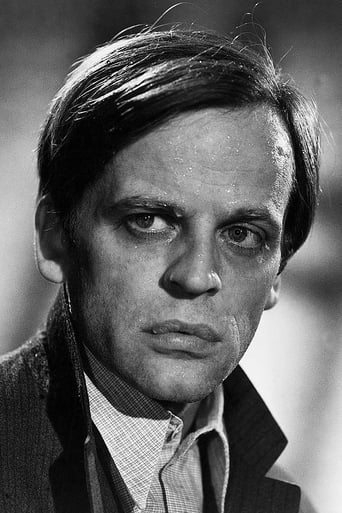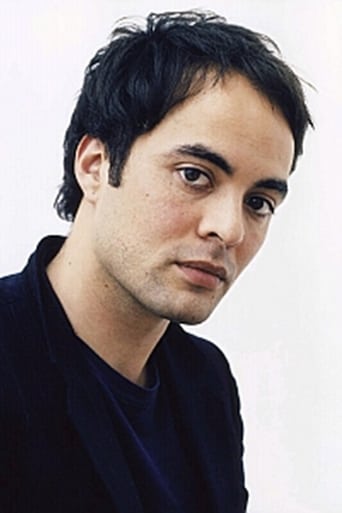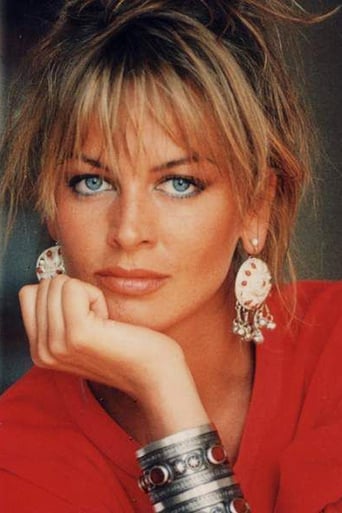MARIO GAUCI
Having appeared briefly in A SONG TO REMEMBER (1945), the Hollywood film about Frederic Chopin, I thought of watching this radical take on the life of Niccolo' Paganini (his own mainstream biopic came courtesy of the British THE MAGIC BOW {1946}, starring Stewart Granger). Anyway, this notorious film proved not only Kinski's sole directorial effort but his swan-song. By this time, he had proved so difficult that nobody wanted to employ him – the film's producer, Augusto Caminito, was apparently one of the few who could reason with him and, in fact, apart from helming the little-seen GRANDI CACCIATORI (1988; co-starring Harvey Keitel), he would replace Mario Caiano after the latter threw in the towel and abandoned VAMPIRE IN VENICE (1988)! Those two films were nothing to write home about, but they feel like real cinema, whereas this is an incoherent mess of a softcore home movie! Apparently, Kinski identified with violinist Paganini (who here is repeatedly described as a crippled monster yet women shamelessly lust for him!) because of their parallel lives – both being misunderstood geniuses with a voracious sexual appetite (of course, the fact that Kinski saw himself like that speaks volumes about the size of his ego)...to the point that the film is generally referred to as KINSKI PAGANINI! Incidentally, the version I watched (where Kinski delivers his own lines in soft-spoken but heavily-accented Italian, despite being ostensibly a local!) ran just 81 minutes, which is how it was released theatrically (edited from a reportedly 12-hour TV mini-series!). Why the film was given a manic, haphazard pace (there is no plot to speak of here, as if we were only intended to catch a cursory glimpse of Paganini's backstory, which basically resolves itself in a succession of carriage-rides anyway!) when it could have been extended to, say, 2 hours with a proper beginning, middle and end, is beyond me – but, then, it would probably not have been worthy of attention, except that, as it stands now and the way I see it, it only elicits contempt! I know of Kinski's reputation (the Italian "Stracult" TV program even showed scenes of him going apeshit during the shooting of this very film, its subsequent press conference and other Italian movies he worked on) but this had never interfered with my appreciation of his undeniable acting talent. Here, however, by assuming complete control (after his frequent director Werner Herzog turned him down flat, which soured their relationship even more than it already was!), one can only place the film's shortcomings at his door. For the record, a recent German DVD edition unearthed a "Director's Cut" of PAGANINI running 95 minutes, which suggests that Kinski always knew he would end up with merely the skeleton of the original version – indeed, on the afore-mentioned program, Kinski is seen wildly operating the camera himself, and no amount of post-production tweaking can adjust a shot that is badly-framed, out-of-focus or underexposed…but, as I said, more judicious editing – rather than relying solely on instinct – could have improved the overall quality or, at least, allowed the viewer to care about what he was being asked to watch! Needless to say, the film ends up giving Art-house cinema a bad name, not just because of its ungainly approach but mainly because it cannibalizes other film-makers without ever hoping to match their dexterity: apart from the fragmented structure a' la Nicolas Roeg (down to Paganini's son rushing to and aching over him in slow-motion at the moment of the violinist's death, in a reverse situation to the one at the start of DON'T LOOK NOW {1973}) and its being shot by utilizing only natural light (in clear imitation of Stanley Kubrick's BARRY LYNDON {1975}), we also get an irrelevant horse-mating scene (to go along with shots of Dalila Di Lazzaro pleasuring herself whilst thinking of Maestro Paganini!) lifted outright from Walerian Borowczyk's similarly smutty but far more considerable – and rewarding – THE BEAST (1975)! Incidentally, the film co-stars two of Kinski's family members: his last wife, Debora Caprioglio (billed Kinski), and his son Nikolai Kinski. While the former is not given much to do (especially since she has to share Paganini with so many other adulating women, including Italian starlet Eva Grimaldi as Napoleon Bonaparte' sister, who carries on with Paganini in full military regalia!), the boy is quite good – indeed, the film only connects on an emotional level during his scenes with Daddy (and it was undeniably poignant to watch the older Kinski dote so unreservedly over his offspring, keeping in mind also that he would die within 2 years!). Also turning up briefly in the film are Feodor Chaliapin as an elderly authority figure hellbent on expelling Paganini from the country for his licentiousness, and celebrated mime Marcel Marceau incarnating the musician in a staged parody of his exploits.However, the star/writer/director's egomania, high opinion of himself (at one point, Paganini – and, by extension, Kinski – is literally described as being able to give himself a hard-on through the playing of his musical instrument!) and his lack of experience behind the camera sabotages at every turn the film's aspirations as an objective look at the mind-set of a creative but evidently troubled personality. The fact that Paganini's predilection for underage girls, which obviously landed him in trouble with the Law, elicits the ire of the people can only be shared by the audience, who are thus forced to participate in the masturbatory fantasies of an ageing and deranged narcissist who has pretty much hit rock-bottom on all conceivable levels! In the end, I should mention that Paganini's music is heard practically incessantly throughout but, rather than evoking the accomplishment of the work itself, one is left with ears reeling squeamishly from the strident notes!
acousticroom
Paganini the film by Klaus Kinski is a true work of Art... I think the reviewer before me just flat don't get it, it is far beyond their understanding.... First off Kinski really did capture the personality of the greatest Musician in history Nicolo Paganini... I also think the music in this film is wonderful, the acting is great, the directing is great.. I think one thing that may throw Hollywood fans, is that the film is done for Art reasons not for the all mighty dollar, greed, which is the number one killer of true ART... This film is about MUSIC MUSIC MUSIC.... and I think Kinski did a wonderful job with every angle, Hollyweird has tried their hands at making films about Composers and I think they should leave the Art to the Artist, and the ARTIST here is the passion of Klaus Kinski and the music of Nicolo Paganini.. this is now and will always be one of my favorite films.. if you like true ART and the some of the most amazing music ever written, then get this film you will not be sorry. Bravo for Kinski Paganini.... Curt
wobelix
The tagline is not referring to the (too) many flairs in this film. This is not a film, but a myriad. Not unlike Tarkovsky's 'Mirror', the storyline is labyrinthic. In 'Paganini' we are plunged into the flow of life as seen just before dying, and within the flashbacks there are memories.Son Achille, superbly played by son Nikolai Kinksi (without any hint of the lingual barriers that he must have experienced while shooting this demanding role; check out his role in 'Tortilla Soup', the Ang Lee goes Latin comedy where he plays very nicely a ... Brazilian.) watches the struggle of his father, adding his own reminiscence to the story.Fragmented though it may be, this is a romantic tale, grand & tragic, told with passion and devotion. It took Klaus Kinski 20 years to create his heart's desire. So, I reckon, there are not many "mistakes", "loose ends", "murkiness" or "shabby editing" here. My guess is that all we see is well thought of (referring to the 'version originale' of Kinski himself, as to be seen on the German double disc DVD -with Italian, English & German dubs-, which shows besides loads of exciting extras both the Maestro's version as the producer's vulgarity). It is too easy to criticize. Who understood 'The Mirror' after a few viewings only ?Kinski of course is no Tarkovsky. He is Maestro Klaus, and very probable the reincarnation of Paganini. But his Magnus Epos is not just an homage. It is even more than his life quest. Although Papa Klaus is omnipresent & inescapable, the torch is held by his son. Which makes KK a link between past & future. And that is truly amazing. Mr. Kinski, miracle-man.PS:The story within the story of this story has not finished yet. Maybe one day someone close to the heart and mind of Klaus Kinski will dare and cut a 2hour-version of 'Paganini'. Maybe Mr. Nikolai ?
water-5
In this movie, Kinski gives his last great performance as the 19th century italian violin virtuoso Nicolo Paganini. People even say that Kinski is his reincarnation. At least, what we can say is that Kinski adopted the violin player's lifestyle. Paganini, in his time, was considered the first "rock star" even though rock wasn't even invented yet because he lived a life saturated with late parties, orgies and sexcapades of all kinds. No moral law, Carpe Diem all the way! Kinski was working on this project since the early 1970s. It was his little baby. And even though its narration is without any narration, with no genuinelike biographical anecdotes, its incoherent editing illustrates with wit, passion and violence what the murky worlds of Paganini and Kinski were all about. But beware, sensible people should pass this one.




